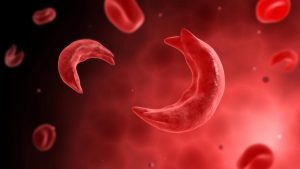
Sickle cell anaemia (Hb SS) is a severe type of sickle cell disease inherited by a child from both parents. That is when the father is a sickle cell carrier (Hb AS) and the mother is also a sickle cell carrier (Hb AS). The disease results when red blood cells produce mostly haemoglobin S instead of normal haemoglobin A. Normal red cells are flexible and their disc-like shape enable them to move easily through blood vessels to carry oxygen to all parts of the body.
In sickle cell anaemia, the abnormal haemoglobin S causes the red cells to become stiff and elongated sickle-shape when the red cells are de-oxygenated and under stress. When this happens, they get stuck and block the blood vessels. The blockage of blood flow through the blood vessels leads to severe pain known as a ‘crisis’.
Signs and symptoms of sickle cell anaemia include severe anaemia, severe episodes of pains (crisis), repeated infections, stroke and damage to major organs of the body. Sickle cell anaemia renders the sufferers into having regular laboratory testing and many hospital admissions. This creates financial burden not only on the sufferers but also on the caregivers and their families. For now, the only cure for sickle cell anaemia is bone marrow transplantation which many families cannot afford for their children.
In Nigeria, about 30% of the country’s population are sickle cell carriers and it is estimated that about 150,000 children are born with sickle cell anaemia yearly. Many of these children die before the age of five from infections or severe anaemia and from lack of proper medical care while many individuals and families living with this disease have limited income and limited access to healthcare facilities, and with the lack of national programmes on health insurance, social and welfare support systems as in developed countries, it is very difficulty for them to manage the disease. This disease has serious psychological, social, and economical implications on the sufferers, families, communities and the nation.There is therefore an urgent need to support the survival and quality of life for the affected children.
PathLab Support assists children from 0-15 years old to pay for the cost of laboratory tests and to offset the hospital bills. With your help, we can support many children in sickle cell crisis and save many lives.
PathLab Support forms long-term partnership with other organisations, healthcare providers, government and non-governmental organisations to provide variety of healthcare support services for individuals and families living with this disease. We also support and promote the prevention of sickle cell disease through genetics counselling for intending couples, health education and community awareness programmes.

